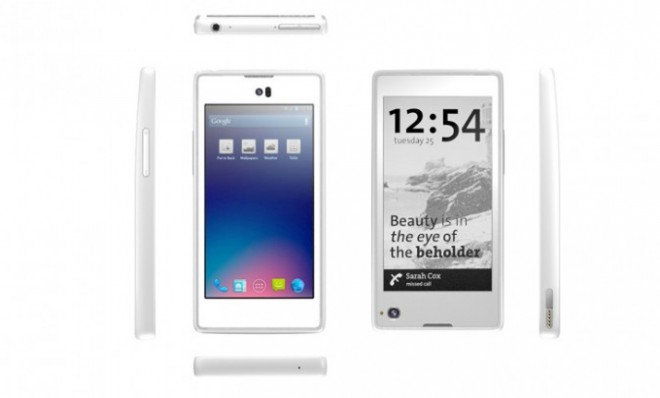Have the Russians developed the smartphone of the future?
The YotaPhone is basically an iPhone with two faces: An LCD touchscreen on one side, and a black-and-white reader on the other


A free daily email with the biggest news stories of the day – and the best features from TheWeek.com
You are now subscribed
Your newsletter sign-up was successful
It's been a long time since the U.S. and Russia were in a serious technological race, and at least one Russian company has gotten tired of watching old highlight reels of Sputnik. Yota Devices, formerly a unit of Russia's state-run defense corporation, has unveiled a new smartphone that the company hopes will challenge the global supremacy of Apple's iPhone. The YotaPhone features a color, LCD touchscreen on one face, and a black-and-white e-reader on the other. "We created this to be different," CEO Vladislav Martynov tells The Wall Street Journal. "Most phones nowadays are boring — they are just boxes. This is a phone for people who want to be outside the box."
So what exactly is the point of a Janus-like phone? Yota says it's fulfilling a demand for more screens, as users increasingly employ their smartphones for a variety of purposes. The e-reader, which is designed to stay on constantly, can feature a Twitter stream or stock market quotes. The phone will also reduce the strain on the battery by throwing certain data — such as playlists or appointments — from the energy-guzzling touchscreen to the reader, supposedly boosting battery life by 50 percent. Furthermore, the reader can be used for more banal purposes: Showing the time, actual reading, or displaying a boarding pass, which will remain on screen even if the phone runs out of power.
The phone runs on Google's Android operating system, and both screens are 4.3 inches. It will retail for about $500 when it makes its Russian debut in 2013, and Martynov says he's sending out prototypes to carriers in Europe, Asia, and North America to gauge interest there.
The Week
Escape your echo chamber. Get the facts behind the news, plus analysis from multiple perspectives.

Sign up for The Week's Free Newsletters
From our morning news briefing to a weekly Good News Newsletter, get the best of The Week delivered directly to your inbox.
From our morning news briefing to a weekly Good News Newsletter, get the best of The Week delivered directly to your inbox.
Analysts are divided on whether the YotaPhone will make an impression. There's a lot going against it: For one, "it remains to be seen whether the market treats this as a hardware gimmick, or something truly useful," says Ingrid Lunden at TechCrunch. In addition, there are "big risks involved when any smaller player tries to challenge hardware giants based on one particular selling point," says Sharif Sakr at Engadget, "although there are quite a few examples of that succeeding, especially in emerging markets."
Some are even more skeptical, according to the BBC:
"I don't see many users wanting this device in the U.S. or Western Europe," said Francisco Jeronimo, research manager at consultants IDC.
"China may be different — they like more gimmicky phones that can handle several Sim cards and feature unusual types of display — but none of those devices have done well elsewhere."
However, Martynov insists that smartphone users have moved beyond the single screen. "Two years ago we were not so dependent on all the kinds of information we consume now, from Facebook and Twitter to news and other RSS feeds," he tells the BBC. "The smartphone is now a window onto this virtual life, but today there's a lot of disappointment when you miss information."
A free daily email with the biggest news stories of the day – and the best features from TheWeek.com
Ryu Spaeth is deputy editor at TheWeek.com. Follow him on Twitter.
-
 The Week Unwrapped: Do the Freemasons have too much sway in the police force?
The Week Unwrapped: Do the Freemasons have too much sway in the police force?Podcast Plus, what does the growing popularity of prediction markets mean for the future? And why are UK film and TV workers struggling?
-
 Properties of the week: pretty thatched cottages
Properties of the week: pretty thatched cottagesThe Week Recommends Featuring homes in West Sussex, Dorset and Suffolk
-
 The week’s best photos
The week’s best photosIn Pictures An explosive meal, a carnival of joy, and more